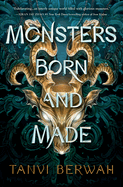
In Tanvi Berwah's fast-paced, gripping debut, Monsters Born and Made, a young woman competes in a deadly tournament against the upper-caste members of her society to protect her family. This South Asian-inspired fantasy is harrowing and action-packed, with a lovers-to-enemies storyline, class divides and a deadly competition.
A thousand years ago, a group of voyagers fled their corrupted home and arrived on the Islands of Ophir with hope for a better future. What they found were 10 islands with 100-degree temperatures nearly every day, surrounded by the Panthalassan Ocean, filled with "sea creatures that are terror made into flesh." After great wars for control over resources, a "World Renaissance" occurred, in which a group of artists, architects and engineers ("Landers") rose above the rest, favored themselves with the safety of underground caves and assigned roles and a name ("Renters") to those they deemed lesser. A "Landmaster" was assigned to each island, and the POWs and criminals of society were made to fight with "maristags" to remind everyone of the "brutality of this world and what happens when you can't match its power." One prisoner survived, having tamed his maristag--a bipedal amphibious "living nightmare" with antlers and blade-sharp frillfins on its neck that can launch venomous harpoon-like barbs. That prisoner was named "First Champion." In his honor, the Landers began holding a "Glory Race" every four years, a tournament spread over multiple days with 10 charioteers, ages 16 to 20. The 10 race until one champion is left standing. Their prize: more gold than one could ever need in a lifetime.
While the Landers view the race as a celebration of resilience, 16-year-old Koral Hunter and her older brother, Emrik, descendants of the First Champion, see it as survival. Over the years, the Hunters, a sub-caste of the Renters, have risked their lives to capture and breed maristags. Hunters then train and sell the offspring to upper-caste Landers who will be competing in the quadrennial competition. On the last day of this hunting season, Emrik is severely injured. Koral saves her brother's life, but in doing so, allows the last maristag of the "annual upwelling of the waters" around her home island of Sollonia to get away. The teen Hunters return home bloodied and empty-handed. With the family's debt piling up and no money to buy medicine for her youngest sister's failing health, Koral decides to do something no Renter has ever attempted: cheat her way into the upcoming Glory Race--and win.
But Koral is competing against charioteers who have been training their whole lives. One such competitor is "golden boy" Dorian, a descendent of one of the island's founders, whom Koral cared for when they were simply "two kids who liked maristags and the sea and not [their] fathers." Until, that is, he started treating her like a stranger. As Dorian's father tries to eliminate Koral and a renegade group that wants to be "treated like they matter" rises in power, Koral must use tenacity and her knowledge of maristags to survive--sparing her family from the human (and real) monsters of Sollonia.
At the heart of Koral's story is a critique of the South Asian caste system. Through her lush world-building, Berwah deftly discusses oppression, inequality in healthcare and prejudice within castes. The Renters, who live in the desert-like climate of Sollonia, die gruesome deaths under the sun and suffer "lesions from sun exposure," "wounded eyes stitched haphazardly" and "bones broken and rejoined together wrong." Landers live safely in the "Terrafort," a subterranean hollow that protects the residents from the harsh sun and dangerous ocean, never having to worry about medical supplies or a monstrous creature swallowing their family whole. Renters are exposed daily to brutal temperatures, "making do with sand ink tattoos and skaya jelly as a sun shield," while Landers hoard the best heat repellents and sun blockers even if they don't need them.
The Hunters are a sub-caste, somewhere in between the upper elite--who control the family's status and fear any kind of power in a Renter's hand--and Renters, who think Koral and her family are traitorous sellouts. "The margin of the margins is a dangerous place to be," says Koral's mother, and Berwah shows this through rebels humiliating, attacking and blacklisting Koral from trading for loans or much-needed medical supplies.
The citizens of Sollonia aren't the only monsters in Berwah's story, however: actual beasts circle the island, lying in wait to devour its residents. Between the raptors with "saw-like teeth"; pocked-skin, winged "aquabats" with pincers; and giant amphibious half-goat, half-fish "capricorns" with claws instead of hooves, Berwah's creatures are frightening, and add another layer of terror to an already intense story.
It's not all doom and gloom, though. The sweet relationship between Koral and her sister, Liria, is heartwarming. Whether it's the two giggling together about their brother's lack of artistic understanding or Koral risking her life to give Liria a better one, the love they have for one another is the perfect balance to the white-knuckle, heart-pounding action in Berwah's enthralling epic fantasy. --Lana Barnes

